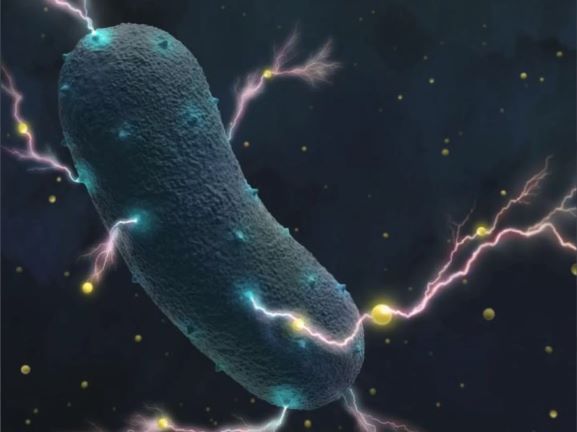

Did you know? The Bacteria in your gut also produces electricity
In the world, where energy transition is gaining pace, Renewable energy with all its glory can’t compete with the fossils without battery storage.
The International Energy Association (IEA) estimates that, in order to keep global warming below 2 degrees Celsius, the world needs 266 GW of energy storage by 2030, up from 176.5 GW in 2017.
At present, no existing technology provides large-scale storage and energy retrieval for sustainable energy at a low financial and environmental cost. However, scientists at Cornell University working with electroactive microbes could be part of the solution. According to the university, these microbes are capable of borrowing an electron from solar or wind electricity and using the energy to break apart carbon dioxide molecules from the air. The microbes can then take the carbon atoms to make biofuels, such as isobutanol or propanol, that could be burned in a generator or added to gasoline, for example.


“We think biology plays a significant role in creating a sustainable energy infrastructure,” said Buz Barstow, assistant professor of biological and environmental engineering. “Some roles will be supporting roles and some will be major roles, and we’re trying to find all of those places where biology can work.”
Barstow is the senior author of “Electrical Energy Storage With Engineered Biological Systems,”, which talks about adding electrically engineered (synthetic or non-biological) elements could make this approach even more productive and efficient than microbes alone.
Natural photosynthesis already offers an example for storing solar energy at a huge scale, and turning it into biofuels in a closed carbon loop. It captures about six times as much solar energy in a year as all civilization uses over the same time. But, photosynthesis is really inefficient at harvesting sunlight, absorbing less than one percent of the energy that hits photosynthesizing cells.
“We are suggesting a new approach where we stitch together biological and non-biological electrochemical engineering to create a new method to store energy,” said Farshid Salimijazi, a graduate student in Barstow’s lab and the paper’s first author.
Electroactive microbes let us replace biological light harvesting with photovoltaics and create engineering choices. These microbes can absorb electricity into their metabolism and use this energy to convert CO2 to biofuels. The approach shows a lot of promise for making biofuels at higher efficiencies.
Electroactive microbes also allow for the use of other types of renewable electricity, not just solar electricity, to power these conversions. Bacteria could be engineered to reverse the process, by converting a bioplastic or biofuel back to electricity. These interactions can all occur at room temperature and pressure, which is important for efficiency.
The authors point out that non-biological methods for using electricity for carbon fixation (assimilating carbon from CO2 into organic compounds, such as biofuels) are starting to match and even exceed microbes’ abilities. However, electrochemical technologies are not good at creating the kinds of complex molecules necessary for biofuels and polymers. Engineered electroactive microbes could be designed to convert these simple molecules into much more complicated ones.
Under current trends, Bloomberg New Energy Finance predicts that the global energy storage market will grow quickly to a cumulative 942 GW by 2040 (representing $620 billion in investment over the next two decades). Which means as Renewable energy takes its place on the podium, energy storage will be right there to support it.
India’s ethanol initiative has helped India save Rs. 1,26,210 crore in foreign exchange by reducing…
Noida-based green energy leader NexGen Energia Ltd has secured a $1 billion equity investment commitment…
As Odisha takes firm steps toward a just transition from fossil fuels to renewable energy,…
Bio-Integrated cladding for greener cities, an innovative solution by a 29-year-old Indian architect, has won…
In a novel move, Farmwatt Innovation has launched a long-term training and capacity-building initiative focused…
State owned Bharat Petroleum Corporation Ltd (BPCL) has joined hands with GPS Renewables Pvt Ltd…